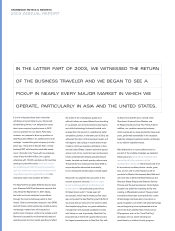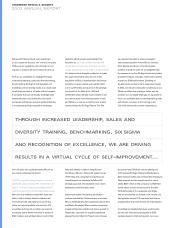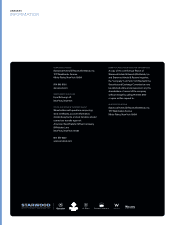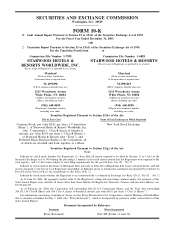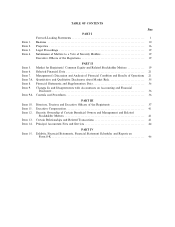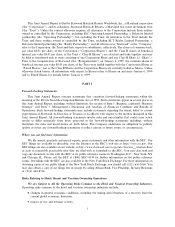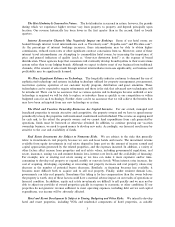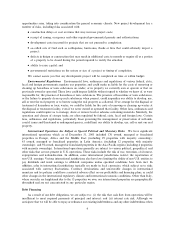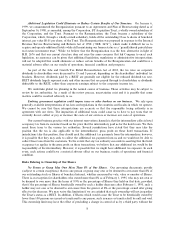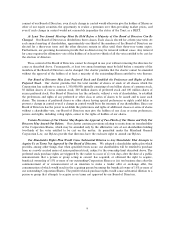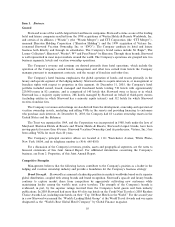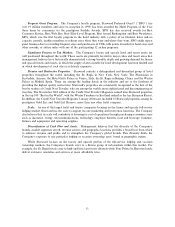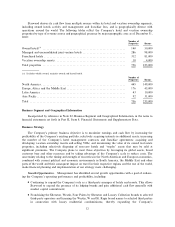Starwood 2003 Annual Report Download - page 12
Download and view the complete annual report
Please find page 12 of the 2003 Starwood annual report below. You can navigate through the pages in the report by either clicking on the pages listed below, or by using the keyword search tool below to find specific information within the annual report.¬domestic and international political and geopolitical conditions;
¬travelers' fears of exposures to contagious diseases;
¬decreases in the demand for transient rooms and related lodging services, including a reduction in
business travel as a result of general economic conditions;
¬the impact of internet intermediaries on pricing and our increasing reliance on technology;
¬cyclical over-building in the hotel and vacation ownership industries;
¬restrictive changes in zoning and similar land use laws and regulations or in health, safety and
environmental laws, rules and regulations and other governmental and regulatory action;
¬changes in travel patterns;
¬changes in operating costs including, but not limited to, energy, labor costs (including the impact of
unionization), workers' compensation and health-care related costs, insurance and unanticipated costs
such as acts of nature and their consequences;
¬disputes with owners of properties, franchisees and homeowner associations which may result in
litigation;
¬the availability of capital to allow us and potential hotel owners and franchisees to fund construction,
renovations and investments;
¬foreign exchange Öuctuations;
¬the Ñnancial condition of third-party property owners and franchisees; and
¬the Ñnancial condition of the airline industry and the impact on air travel.
We are also impacted by our relationships with owners and franchisees. Our hotel management contracts
are typically long-term arrangements, but most allow the hotel owner to replace us if certain Ñnancial or
performance criteria are not met. Our ability to meet these Ñnancial and performance criteria is subject to,
among other things, the risks described in this section. Additionally, our operating results would be adversely
aÅected if we could not maintain existing management, franchise or representation agreements or obtain new
agreements on as favorable terms as the existing agreements.
General Economic Conditions May Negatively Impact Our Results. Moderate or severe economic
downturns or adverse conditions may negatively aÅect our operations. These conditions may be widespread or
isolated to one or more geographic regions. Our worldwide results during the Ñrst nine months of the year,
primarily in North America, were negatively impacted by the low industry-wide lodging demand as a result of
the current global economic conditions. A tightening of the labor markets in one or more geographic regions
may result in fewer and/or less qualiÑed applicants for job openings in our facilities. Higher wages, related
labor costs and the increasing cost trends in the insurance markets may negatively impact our results as wages,
related labor costs and insurance premiums increase.
We Must Compete for Customers. The hotel and vacation ownership industries are highly competitive.
Our properties compete for customers with other hotel and resort properties, and, with respect to our vacation
ownership resorts, with owners reselling their vacation ownership interests (""VOIs''). Some of our competi-
tors may have substantially greater marketing and Ñnancial resources than we do, and they may improve their
facilities, reduce their prices or expand or improve their marketing programs in ways that adversely aÅect our
operating results.
We Must Compete for Management and Franchise Agreements. We compete with other hotel
companies for management and franchise agreements. As a result, the terms of such agreements may not be
as favorable as our current agreements. In connection with entering into management or franchise agreements,
we may be required to make investments in or guarantee the obligations of third parties or guarantee
minimum income to third parties.
2



